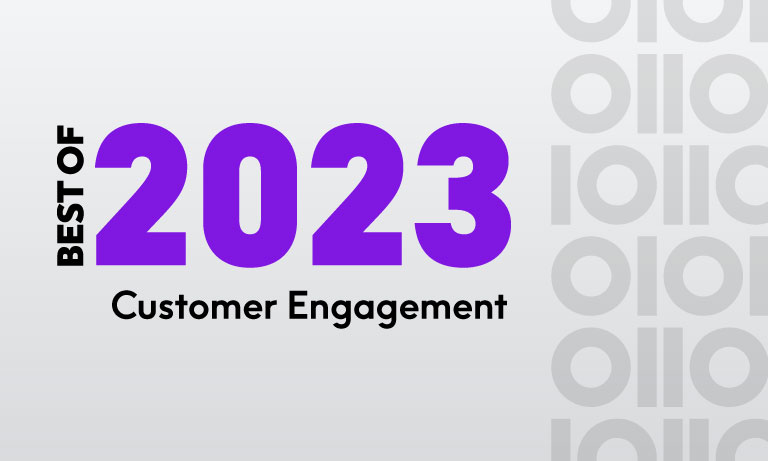
Customer Engagement Trends for 2024

Intensive digitization and the rise of artificial intelligence (AI), an uncertain economic climate, and evolving consumer expectations mean that delivering an outstanding customer experience (CX) is more important than ever. While companies are making progress, 2024 will bring new challenges in meeting rising consumer expectations.
Customers expect seamless and personalized experiences that meet them wherever they are in a dynamic, non-linear journey from awareness to purchase to loyalty. Building that loyalty and generating sales requires investments in integrated, AI-based technologies, high-quality and readily available data, and commitment to an enterprise-wide focus on CX.
As we think about 2024 trends, here are a few key things to know:
- Consumers are 80% more likely to make a purchase when offered a personalized experience
- 88% of marketers report that personalization delivers a measurable lift in business results
- The probability of selling to an existing customer is 60%-70%, but only 5%-20% for new prospects
- Increasing retention by as little as 5% can boost profits by as much as 95%. Attracting a new customer costs 5X more than retaining an existing one.
So, while engaging with new customers contributes to conversions, exceeding their CX expectations keeps them coming back – and that’s where you find the real payoff in growth and profitability.
Here are the key customer engagement trends to watch for 2024 and beyond:
Generative AI is Coming to Self-Service and Customer Support
This year we’ll see more organizations employing generative AI for their business processes and including CX as a top use case, complementing the use of other machine learning capabilities such as natural language processing and predictive analytics. In CX, generative AI applications can include language translation and localization, consumer research and behavioral analysis to deepen understanding, and helping customer service reps research answers to complex queries.
But it’s critical to remember that when it comes to AI outputs, your results will only be as strong as the data that’s feeding them.
Trusting your data is the cornerstone of successful AI and ML (machine learning) initiatives, and data integrity is the key that unlocks the fullest potential. Without data integrity, you risk compromising your AI and ML initiatives due to unreliable insights and biases that don’t fuel business value.
But with data integrity, you gain more trustworthy and dependable AI results for confident data-driven decisions that help you grow the business, move quickly, reduce costs, and manage risk and compliance.
The bottom line? AI holds tremendous potential, but massive risk when the data isn’t trustworthy. Ensure data integrity to avoid bias and false responses, and remember to be transparent and honest about AI use to gain customer trust.
Smart Chatbots With a Human Touch
Consumers have spoken, and the majority prefer the speed and convenience of self-service for getting answers to simple questions. Gartner research has found that 85% of consumers will engage with a brand without ever interacting with a human. And while knowledge bases and FAQs are useful self-service tools, an intelligent chatbot delivers a superior CX.
Through the power of AI and natural language processing (NLP), today’s chatbots provide human-like conversational engagements that deepen the connection with your brand. Customers type their questions using their own words, and NLP maps the request to the right answer. Nevertheless, in 2024, chatbots will also need the technology to combine personalization with trustworthy customer data to meet expectations.
Read our Report
How Data is Driving Next Generation Customer Experiences
Read this report and see how improving customer satisfaction levels is a priority for 84% of organizations, but in the wake of the pandemic businesses are also focused on practicalities.
These smart chatbots tailor responses based on which products the customer owns, or the products and services they’ve been exploring online. Contextual responses that zero in on a consumer’s actual needs can solve problems faster, eliminating customer frustration and dramatically improving CX. At the same time, chatbots must enable a seamless handoff to a live rep if customers need more help. A good experience can turn bad quickly if the customer has to repeat information.
Omnichannel Only Works When It’s Timely
Omnichannel started out as connecting with customers across multiple channels, from email to phone to chat, social, mobile, video, and messaging. Being consistent with branding and messaging across these channels is challenging enough. For 2024, success will depend on meeting customers wherever they are and providing a seamless experience irrespective of channel choice.
Today, customers use an average of nine touchpoints to engage, with more than half of those touchpoints taking place online. Seamless experiences mean your customers don’t have to repeat their story at every step on a journey to get a question answered or a problem resolved. The same holds true for outbound communications like personalized emails and real-time alerts.
Technologies like smart authentication, a platform approach to unifying omnichannel engagements, and integration with CRM and back-office systems — combined with the most up-to-date, accurate data available in real time — can keep omnichannel on track with customer expectations.
Innovate With Persistent, Deeper Personalization
Today’s consumers want to feel seen by the companies they do business with. In 2024, they expect a highly personalized experience with every interaction — and they don’t want to see information that isn’t relevant to them. Excelling at personalization is core to building the emotional engagement that leads to lifetime customers, and it’s closely tied to achieving seamless omnichannel communications.
It’s not enough anymore to simply add their name to an email greeting. Deep personalization at scale requires a structured, disciplined approach to managing, analyzing, and utilizing customer data. It can include product recommendations based on past purchases and individualized marketing campaigns.
Innovative companies are wowing customers with approaches like interactive personalized videos that enhance CX at journey stages like onboarding, renewals, and explaining complex products.
Data Integrity and Security Drive Trust and CX Excellence
Ultimately, outstanding customer engagement is driven by data.
The challenge is that many businesses struggle to turn their data into usable assets for CX applications. According to Corinium, only 37% of organizations have a well-developed enterprise data architecture that enables high-quality, data-driven, and personalized CX.
It’s not that companies lack data about customers. Rather, they lack the tools, programs and integration needed to achieve data integrity. Customer data must be accurate, consistent, and contextual to be trusted for enterprise-scale omnichannel customer experiences.
At the same time, companies in 2024 need to stay laser focused on safeguarding customer data and meeting regulatory requirements around security, privacy, and accountability. Recent research from Precisely and Drexel University’s LeBow College of Business found that 75% of data professionals surveyed are looking to improve data quality and trust while 57% are concerned about improving regulatory compliance.
Effective data governance is a key step toward achieving data integrity, enabling data security and compliance, and providing trusted data for CX initiatives. It also enables organizations to track and be transparent about how they use customer data and ensure data privacy.
To learn more about trends in customer engagement, read our Corinium report: How Data is Driving Next-Generation Customer Experiences



